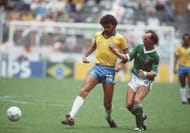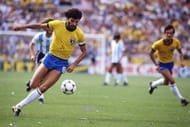14th June 1982
Estadio Ramon Sanchez Pizjuan, Seville
The atmosphere inside the Pizjuan was pregnant with disappointment. They'd heard so much about this Brazil team. They were supposed to be the antithesis of the dull sides of '74 and '78 - teams that had been filled with thugs and ruffians, sides that kick-by-punch knocked back the legacy of the great '70 team into the deepest recesses of memory. And yet... the Soviet Union had scored early on thanks to an absolutely farcical error from their comical goalkeeper Waldir Peres. Easily the better team at that point, they were holding off the men in canary yellow with ease; a doughty, hardened bunch of veterans standing firm in front of arguably the best goalkeeper in the world at the time, Rinat Dasayev.
Brazil were going to need something spectacular to break this lot down. Enter, stage far left, their captain.
With barely a quarter of an hour to go, receiving the ball some forty yards out after a scrambled half-clearance from the Soviets, he dropped a shoulder to evade a desperate lunge before dropping another to send another red-shirt scrambling to the wrong fire. With space in front of him, he looked up, thirty yards out, and absolutely leathered one. The brilliant Dasayev got a hand to it, but there was no stopping it.
Sócrates had arrived.
Brazil were back.
“We had to deal with the anxiety of being behind for most of the game,” Sócrates remarked, as quoted in the excellent Doctor Socrates by Andrew Downie. “We tried everything to get near the Russian goal. A sure defence and a magnificent goalkeeper looked like they would stop us from making our dream come true. And then the ball fell to me. There was a wall of red shirts ready to spill their own blood to stop me. I feinted to shoot and jinked to the right. A space opened up. I feinted again and an even bigger space appeared. I put everything I had into my shot. And the scream came: Goooallll. No, not a goal. An endless orgasm. It was unforgettable.”
12th June 1986
Estadio Jalisco, Guadalajara
The biggest match Nigel Worthington had been involved in before taking the flight to Mexico had been his debut. It'd been 2 years ago when Northern Ireland took on Wales in the last ever British Home Championship and drew them 1-1. It was a point that allowed them to keep the trophy in perpetuity.
Having qualified for Mexico '86 they'd put up a superb fight against the talented - but underachieving - Spaniards in their opener. This, though, was something else.
This was Brazil.
This was Sócrates.

Worthington didn't play that day, but it's his words that give meaning to just what that entailed.
“We’re all lined up on either side of the tunnel, the nerves are going and you’re looking across at these Brazil players, who all look like such fantastic athletes, and you’re thinking, ‘This is going to be tough’,” Worthington told the Telegraph. “And then I noticed Sócrates just leaning with his elbow against a wall smoking a cigarette. This is like five minutes before kick-off. We’re there thinking, ‘We’ve got our work cut out here’ and Sócrates is just stood there, casual as you like, puffing away, looking like he didn’t have a care in the world. Still to this day, I can picture that scene in my mind."
"When you’re going into a big World Cup game and you’ve got the audacity to stand in the tunnel smoking a cigarette moments before kick-off you’ve got to say you’re some player."
***
To separate Sócrates the player and Sócrates the person would be to commit a cardinal sin - the player who belted that opener in against the Soviets, and the man who stood in the tunnel languidly sipping on a ciggy were one and the same.
It's what made him... him.
It'd be criminal to view him merely as the player who captained arguably the most loved football team of all time. It would be to take away from the man who delayed his entry into the Selecao so as to pursue, and complete, a degree in medicine. From the man who convinced his club-mates to vote on every decision they made from transfer to bathroom breaks, a concept called Democracia Corithiana, alien in the dictatorial landscape of Brazilian football. From the man who pressurised the military junta into conducting municipal elections for the first time in nigh on two decades. From the man who loved a cold beer more than anything else. From the man who knew that football was just a game... to be enjoyed, to be loved, to be lived.
He was, though, some player.
A tall, lean man, with flowing locks and a beard to die for, Sócrates did what he wanted on the football pitch, and he did it better than most anyone else. He counteracted his inability to turn quickly by perfecting the backheel... he was so good at it that Pele once remarked that he could play better going backwards than most players could going forwards. He didn't do anything as uncouth as sprinting, but his long, easy, strides allowed him to cover ground far faster than most. And as he showed against the Soviets, he could belt them with his right foot... but it was an instrument that could cajole as well as it could hammer and he could pick a pass out with uncanny precision.
His team, Tele Santana's team, played football without boundaries, without limitations, without fear. You could call it naive, we prefer to call it beautiful.
The Doctor, though, called his team's style of play "organised chaos"
“Everyone has the freedom to play how they wish as long as they perform certain basic functions. As amazing as that might seem, it works. It comes … from improvisation, but also from the knowledge that was acquired in two years of working together,” he said. “I play on the wing, I am a center-forward, a sweeper, holding midfielder … it depends on how the game is going. Even if we don’t win the title, we’ll have altered the traditional schemes of 4-2-4 and 4-3-3 and whatever else they have invented.”
And they had.
Systems, tactics, statistics fell by the wayside as the '80s Brazil side one-touch passed and nutmegged their way to footballing folklore.
In '82, after Sócrates inspired the comeback against the USSR, Brazil swept aside all comers till they met the excellent Italians and their on-fire striker Paolo Rossi... needing only a draw, they attacked like naive schoolchildren and were punished for it. Not one of them regretted it, though.

In '86, Sócrates wasn't at the level he'd been at four years previously, but he was still majestic, helping Brazil to the quarters... where they lost to France on penalties. The Doctor saw his one-step lazy-flick (something his dad had warned would get him in trouble the day he became a professional, but something he continued with as a matter of principle) saved easily by Joel Bats in the French goal. Most people would have been devasted (picture Robbie Baggio and that cry of agony), he just shrugged and got on with it.
After all, it's just a game.
In the end, they - and he - won the square root of jack all, but he'd showed the world that sometimes it's not the results that matter. Sometimes it's not about who wins or who loses.
Sometimes it's about how you do it.
For that, for leading from the front and living the philosophy he constantly espoused, for being the single coolest man to have kicked a football around... Doctor Sócrates eases into our list of 50 Greatest Players in World Cup History with a cold one in hand.
